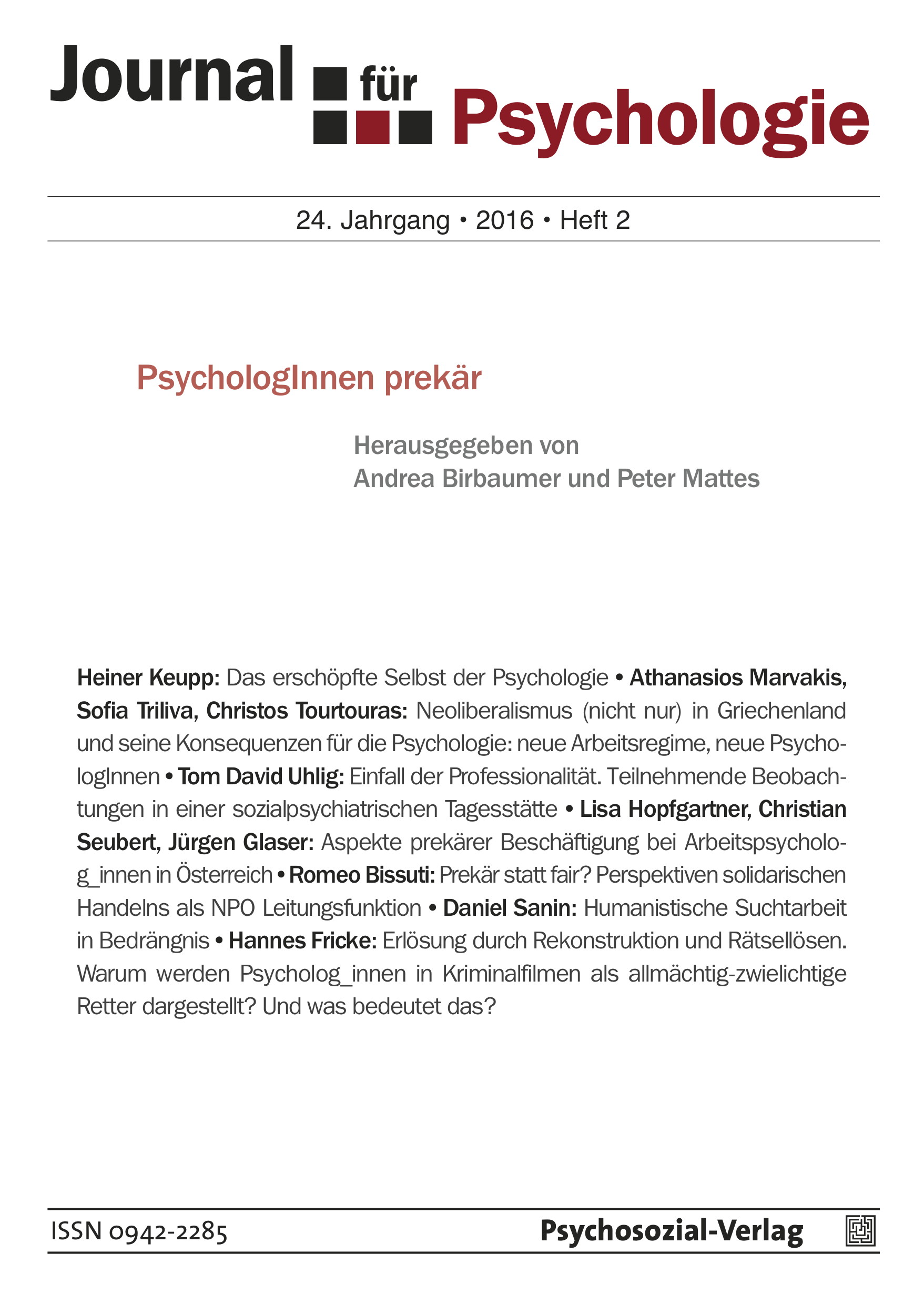Neoliberalism (not only) in Greece and its repercussions in psychology: new working regimes, new psychologists
Keywords:
Neoliberalism, Psychology in Greece, NGOisation of labour, Working regime, Regime of Agency, Precarity, Austerity, LiminalityAbstract
»Neoliberalism« is doing much more than transforming the »economies« of nations around the world. In fact, in Greece precarity and austerity have ensued soon after the draconian neo-liberal adjustments. Such impacts are not only articulations or outgrowths of particular policies but also tools in the imposition of a fundamental reconfiguration of our »social imagination« impacting all aspects of society’s organization: institutions, organization of labor, individuals, needs, rights, etc. The entire scheme of what and how society ought to look like has been reconfigurated from anew. The neo-liberal transformation of Greek society has not only affected working conditions (»precarity & austerity«), but it has also created new spaces, new contents and new worker-subjects which come about through the «NGOisation” of psychological work. NGOisation should not to be construed as a substitute for the public by the private, but as the creation of a new regime of relationships between public and private. The whole process of NGOisation has to be grasped more as a »methodology« changing and transforming the functions of all of its contributors, actors, constituents; that is, the NGOs themselves, the state, and the subjects who act under its auspices. The contested practices and the new work regimes, in turn, demand and produce new subjectivities and new forms of social practice. Working in NGOs as a young social scientist is not only precarious; it also engenders changes and transformations within psychosocial settings where the work takes place. The induced changes in the nature of the work and how it is organized is rendered similar to those of high-tech settings. This includes traditional application of cutting-edge knowledge, well-honed abilities, and reflective practice, along with a concomitant and continuous production of knowledge, and learning. Moreover, these jobs require that the young social scientists maintain their keep; in essence, bringing in funds and grants that will allow them to draw a salary. Hence, these kinds of jobs are usually accompanied by increased demands and certainly »new forms« of worker subjectivity. In a second step we will make a historical step forward and update our previous reflections presenting findings from our explorative qualitative inquiry focusing on psychology’s influx in schools in Greece during the »crisis«. We asked young psychologists to describe their work, their responsibilities, and sense of professional identity during their short tenure in the schools. Discussion focuses on issues of austerity, professional precarity, and the nuances of how »evaluation« and »support« services are implicated and, in turn, legitimize »psychologizing« practices. By this it maybe become more clear that and how the NGOisation of labor with its colonial logic expands more and more towards society.Downloads
Published
2016-12-06
How to Cite
Marvakis, Athanasios, Sofia Triliva, and Christos Tourtouras. 2016. “Neoliberalism (not Only) in Greece and Its Repercussions in Psychology: New Working Regimes, New Psychologists”. Journal für Psychologie 24 (2). https://journal-fuer-psychologie.de/article/view/410.
Issue
Section
Schwerpunkt
License
This license allows private use and unmodified distribution, but prohibits editing and commercial use (further information can be found at: https://creativecommons.org/licenses/by-nc-nd/4.0/).
The terms of the Creative Commons licence only apply to the original material. The reuse of material from other sources (marked with a reference) such as charts, illustrations, photos and text extracts may require further permission for use from the respective copyrights holder.



